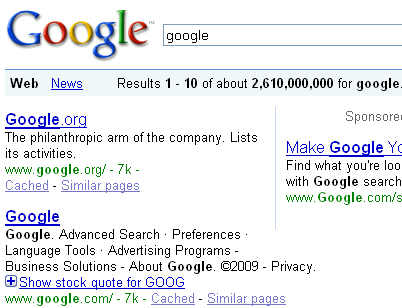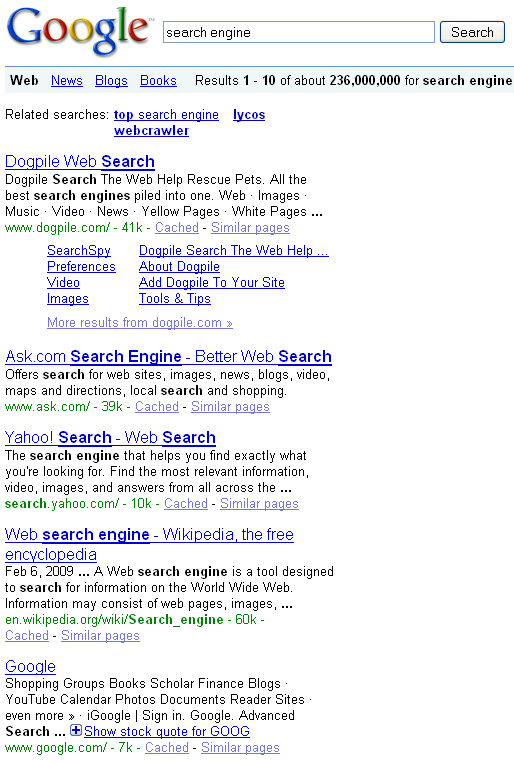Today I thought I’d do a really random search, so I searched for google on google.com. The question: Will Google rank Google.com #1 for a search for google? Or if they do rank themselves #1, why would they do that? If someone is already on google.com and they search for google, would they even click on the search result for google.com? It would make no sense. Confused yet? It only gets worse from here. And here are the results:

Well, there you go. Wait a minute! Google.org?! WTF? What’s that? Oh, it’s the ‘philanthropic arm’ of Google. Why would they do that? According to a linkdomain: query on Yahoo.com, google.com has about a jillion links (actually ~1.19B links) and google.org only has about 270k links. From what I’ve heard about Google’s ranking algorithm, the key to ranking is the quantity and quality of backlinks and anchor text. However, google.org does have a lot more content. Maybe that is the key element driving the top ranking. But seriously, what’s going on here? How does google.org pull a #1 ranking? That’s like me showing up to SkyBar with Megan Fox (btw, she just separated from that dude from 90210). I mean, I’m a nice guy and all, and I’m kinda philanthropic. Plus I once rescued orphaned nuns from a burning cathedral, but that’s Megan Fox. She’s like the #1 ranking these days. [And what about the fact that Google.com is advertising Google.com as the only result in the paid search ads? Is that logical? I guess it’s about as logical as searching for the term google on Google.com.]
Obviously, something is going on here. Most likely it has to do with the fact that if you’re on google.com and you’re searching for Google, you probably don’t want to see google.com as the #1 result. Google recognizes this. They know you’re probably looking for something else besides google.com. I think its for this reason that Google has purposefully placed google.org in the top spot. After all, according to Google’s Keyword Tool, google.org only got ~40,500 searches in January. Google.com got ~13.6M searches, and the term google got ~83.1M searches. It stands to reason that google.org needs some help with exposure, and Google probably wants to get more exposure for the philanthropic arm of their company. Aw shucks. How nice?
It appears Google likes to help out the tired, the hungry and the otherwise unable-to-rank-for-themselves type of sites. But is that philanthropy extended outside the family? Let’s find out. How about a search for the term search engine:

Okay. Now I’m going to throw up. Dogpile.com? Seriously? That’s a little too obvious because dogpile.com is a site that let’s you search for anything, and then it piles (get it?) all the results from G, Y, MSN/Live and Ask into one results page. [Once again, it’s very odd to go to google.com and then search for the term search engine, but it doesn’t change the fact that these results are not necessarily up to par with Google’s reputation for providing the most relevant search results for a given query.] I guess Dogpile is a reasonable #1 result, but the strange thing is that this site is not the most well-known search engine. Google is. The word google is used as a verb in our vernacular these days for heaven’s sake! Furthermore, according to Alexa, google.com is the #1 trafficed site in the world. Dogpile is #1,825. Typically, Google gets this kind of stuff right.
According to the Google Keyword Tool, the term search engine actually gets some searches:

See that? Google reports that the term search engine had over 2.4 million searches in January 2009. If I had an awesome anchor text analyzer, I’d totally compare the anchor text in links to google.com vs. the anchor text in links to dogpile.com. I bet that 99% of links to google.com have Google as the anchor text. Dogpile.com, on the other hand, might actually have more links with the term search engine as the anchor text. I can’t imagine that would be the case, but it’s certainly a possibility. It also occurs to me that Google shouldn’t even rank itself for this search. Why would a user click on the google.com result when they are already on Google. It really doesn’t make any sense. Kind of like this post. It’s filler. And I’ve dragged it out as long as I possibly can. Now I’m kind of hoping no one even sees this one.
Update: I just did another search for google, and after refreshing the search a couple of times, I saw some shifting in the organic results. Google.org, google.com, Google Reader, etc… – they were all changing places. WTF? I’m still confused. It’s pretty clear that this search result does not play by the typical algorithm rules. Me thinks Google has its hands in the search for google.